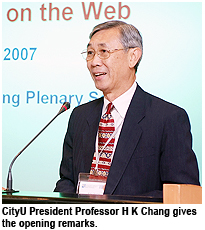Scholars congregate at CityU to plan the curriculum for "A History of Civilizations"
The scholars join hands to devise ways to utilize new Internet technologies to enable students to feast on ancient wisdom. The curriculum aims to introduce youngsters to the pantheons of civilizations in order to train them into generalists capable of drawing reference from the past to understand the present.
The first part of the conference entitled “Civilizations on the Web” is held at CityU on 6 and 7 April. The second part in the conference agenda ‘A Web of Civilizations’ will be held at Peking University on 9 and 10 April.
Renowned scholars from four continents focus their discussion on the design of a one-year curriculum on the history of world civilizations. They also explore feasible ways to use the Internet for global teaching. The web platform would
allow students and teachers to overcome time-space limitations. The course will emphasize the respective evolutions of and interactions among civilizations; and highlight how they influence today’s societies.
Professor H K Chang, CityU President, has been striving to initiate and organize the conference in recent years and is excited to see this goal accomplished. Observing the growing preponderance of finance, commerce, trade, transportation and logistics in Hong Kong’s economy, he pointed out that young people in Hong Kong should deepen their understanding of other cultures. It is especially crucial for them to strengthen their own competitiveness in response to the rapid pace of globalization. Only by expanding their international vista can they do their part in maintaining Hong Kong’s position as a regional hub and an international centre.
“Only by knowing one’s past can one have a foothold on the present and set forth to create the future. Only by acquiring a broad scope of knowledge and an ability to continuously renew it can one take advantage of opportunities as they present themselves and ride on the crests of prevalent trends,” said Professor Chang.
The conference participants are authorities in civilization history. They will first sketch out a framework of the curriculum and then guide academics in special areas to develop the course materials. Doctoral candidates will tutor CityU students taking the courses. Such a global collaborative undertaking that utilizes the Internet as a platform of instruction across the
world is unprecedented in teaching civilization history. Everyone on this platform would benefit from knowledge amassed by established scholars of many cultures. The platform will also address an imbalance in course content on world civilizations; up to now the tradition has been centered on the West.
“Under the ongoing globalizing and diversifying mega trends, history cannot be told from the point of view of one country or one civilization,” said Professor Maurice Aymard, Chief Executive of the Fondation Maison des sciences de l'homme in Paris. He also stressed the importance of protecting the diversity of local cultures in our globalizing world.
Professor Yuan Ming, Associate Dean of the School of International Studies, Peking University, praised President Chang’s vision and passion of convening an international conference on the history of civilizations. She was impressed by her conference colleagues’ high quality and expertise. “Such a presence has never been seen before,” Professor Yuan said. Also unprecedented is the convergence of such rich cross-cultural knowledge and experiences in one meeting, she added.
Professor Richard Ho Yan-ki, Vice President (Undergraduate Education), said five years from now Hong Kong universities will implement a four-year curriculum: “We need to get ourselves prepared and design a curriculum that enhances a balanced personal growth of students. In addition, the new curriculum should inculcate a motivation for self-study in students so that they have a habit and eagerness to become life-long learners.”
He added, “Outsourcing is an emergent mode of operation in globalization. The world civilization curriculum will fit this mode well, for educators can then share resources and leverage overseas expertise. With it we’ll reduce cost, improve efficiency while adding values.”
CityU aims to broaden students’ horizons and nurture them to have a commitment to “make contribution to Hong Kong, care for the development of the mainland, and espouse an international perspective”. It established the Chinese Civilisation Centre nine years ago. Under the guidance of the centre, CityU’s required undergraduate course on Chinese civilization has built a solid knowledge base and accumulated much experience in delivering the course via the Internet. This boosts CityU’s confidence in coordinating the massive enterprise of planning and designing the world civilization curriculum.
Speaking confidently, Professor Cheng Pei-kai, Director of the Chinese Civilisation Centre, said, “We have learned from experience that it is feasible to employ the web to help run courses on civilizations. The Chinese Civilisation Centre has demonstrated that Internet learning can fulfill three functions of teaching: teaching morality, imparting professionalism and solving problems. We are pleased to share our years of experience with the rest of the world.”


